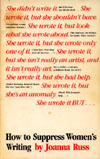
As a member of the entrenched rulers of literature, I could take this thin volume and use it to continue to oppress the writing minorities. In the space of eleven heavily researched chapters, Russ has given me all the tools I will ever need to belittle, demean, steal the credit, cloud the issues, and, generally, keep the pure white male ascendant. This is, of course, necessary, for those of us in power wish to stay in power, naturally.
However, as a cell block leader in the underground fight for equality and justice, I applaud Russ and her insightful view on how the establishment has refused to recognize the work of so many. Lee Ballentine sent me an impassioned plea to read this book after seeing it on my solicitation list, stating (and I paraphrase here) that I, as a reviewer and commentator on literature, need to be aware of what this book has to say. The best way to avoid unconscious bigotry is to be conscious.
I, like most reviewers I would think, believe myself to be blind to anything but the text in front of me. In particular, I’ve always felt that I was gender neutral. When I dropped out of college in 1988 to work, I worked in a field that was typically occupied by women: legal secretary. As a “Kelly Girl,” I loved showing up at a downtown law office and introducing myself as a temp. If there was ever a conservative group of people, lawyers are it. I called this my part in the baffle of the sexes; I hoped I helped to destroy a few preconceptions of what gender a secretary was supposed to be. I bring this up to illustrate the fact that I believe myself a feminist (especially if your definition of this term matches mine: “the radical notion that women are people”). In our premarital counseling, Jill and I took a standardized test to identify our strengths and weaknesses as a couple. The section that we matched highest on, with a 99% correlation, was equality–the sharing of duties, decisions, and responsibility.
All of this is to say that I take Russ to heart here. I looked back over all the previous installments of First Impressions, looking for where I might have fallen prey to one of the attitudes discussed in here. I was happy to note that I only made one reference to the author’s gender when talking about a book by a woman (Rubyfruit Jungle by Rita Mae Brown). However, the sin that I may have committed was the sin of omission; like Russ’ findings in the collections of great literature, my ratio here is quite skewed in favor of males, and authors of color or even of other nationalities are few and far between. Recognizing this does not mean I have to establish a quota to remedy it, but it is something to take into account when I search my shelves of books to read and especially when I get new books.
Like Virginia Woolf’s A Room of One’s Own which I wrote about here several years ago, Russ’ How to Suppress Women’s Writing is somewhat dated, but enough of it is still applicable to merit reading and re-reading. In today’s climate of dismantling the affirmative action process, it is books like this that reminds us why those programs were created in the first place.
[Finished 13 March 1998]
